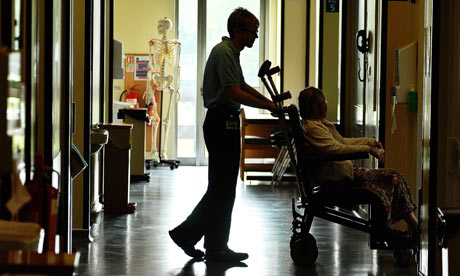
What future is there for NHS hospitals unable to make ends meet? Many people assume the supposedly "bankrupt" South London Healthcare Trust, which runs major hospitals in Bromley, Woolwich and Sidcup, will be handed to the private sector. Some assume it'll be the first of many.
But the private sector is wary. Why take on struggling NHS hospitals? Such takeovers may please a government intent on hacking back the public sector workforce, and a health secretary encumbered with dozens of NHS hospitals too indebted for foundation trust status, but firms see a health sector starved of growth and a tariff system that's become a tool for squeezing costs. They worry about their reputations. And they watch what's happening with Circle, which took over the threatened Hinchingbrooke hospital in Cambridgeshire back in February.
To fulfil its side of the deal, Circle, led by the charismatic chief executive Ali Parsa, needs surpluses of £70m over a decade. It would keep 44%. But Hinchingbrooke hasn't made a £1m surplus this century, so aggressive cost-cutting seems inevitable. Now staff morale and patient satisfaction are falling. By August, according to NHS Midlands and East's measure ("Would you recommend this hospital to your friends and family?"), Hinchingbrooke had dropped from sparkling to average.
Thriving foundation trusts with international reputations, now under the Monitor umbrella, may be tempted into "partnerships". Some offer rich rewards. But most NHS hospitals would need financial bait: subsidies, income guarantees or a material undervaluing of the assets.
For the present, however, the less glamorous non-acute sector of the NHS – worth an estimated £15-20bn – is proving attractive. The principal predators aren't private health providers but global outsourcing companies. Their business model is simple enough: win the tender, take on the staff, shred the management structure and cut costs.
It's privatisation fuelled by the "any qualified provider" regime which, since April, forces NHS commissioners to offer whole services to competition. If there's one field where the outsourcing companies have special expertise, it's competitive tendering. But the process began in earnest two years ago, when primary care trusts were forced to offload the "provider arms" that employed community nurses, therapists and others.
This year Virgin has already won the contract to run community services in north-west and south-west Surrey (worth somewhere between £450m and £650m), and is currently preferred bidder for a £140m contract for children's services in Devon. Serco, meanwhile, captured a £140m contract to run community services in Suffolk.
What makes community health services such a lucrative proposition? Unlike acute hospitals, there's no effective tariff system: measuring what a district nurse or a physiotherapist actually achieves is more complex than counting hospital "spells". Pruning a community team is less visible than closing a hospital. The risks are lower, the profit margins higher.
Despite occasional bad press – Serco's out-of-hours GP service in Cornwall has caused a little local difficulty – the trend is set to continue. Virgin's success in Surrey followed overt pressure from the MP for south-west Surrey on commissioners to expedite the deal. That's Jeremy Hunt, now secretary of state for health.
Government's happy. To smooth Virgin's path into Surrey, it found a device to safeguard the prized NHS pension rights of 2,500 staff. Rather than working directly for Virgin Health, they have transferred instead to the employment of VH Doctors … a social enterprise.
Ah, social enterprise. Many NHS community teams opted in 2011 to form new social enterprises, following the example of Central Surrey Health. Lauded by Gordon Brown and David Cameron alike, it's served 280,000 people in Surrey for five years. But its core mid-Surrey contract is up for renewal. In May, the Department of Health was already warning that, unless they improve their "commercial skills", social enterprises will lose their core NHS contracts as they mature. The whole "movement" could prove no more than a transitional phase. That's unnerving for ministers keen to lure large numbers of local government staff out of state employment.
Now GP practices may be the next target. The £15bn NHS primary care budget is juicy enough, but, cajoled and flattered into taking on the entire £65bn NHS commissioning budget, practices now hold the key to even greater riches. Only 2.2% are currently owned by corporates. That may be about to change.
GPs thought they'd be in charge, but international health insurers and consultancies wait in the wings to help steer commissioning when, inevitably, it flounders.
Did GPs seriously believe they'd be handed control of that much public money?

